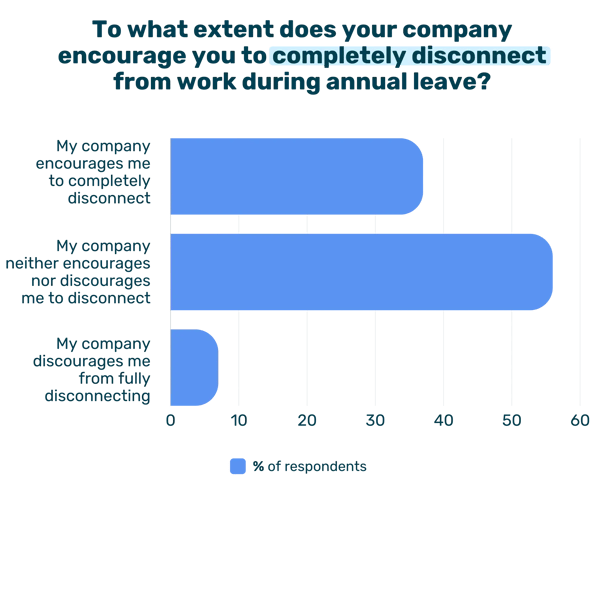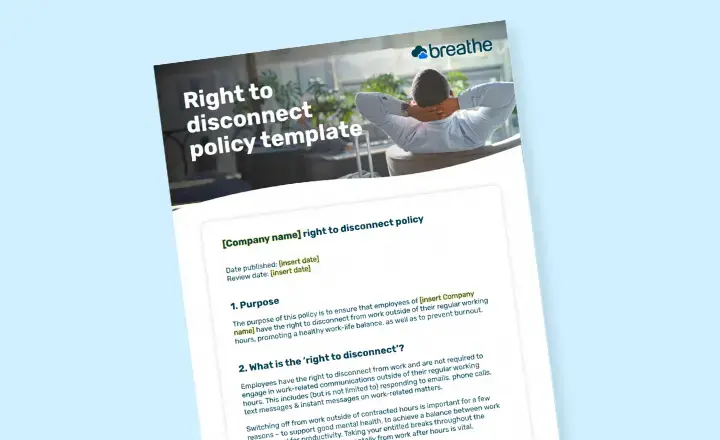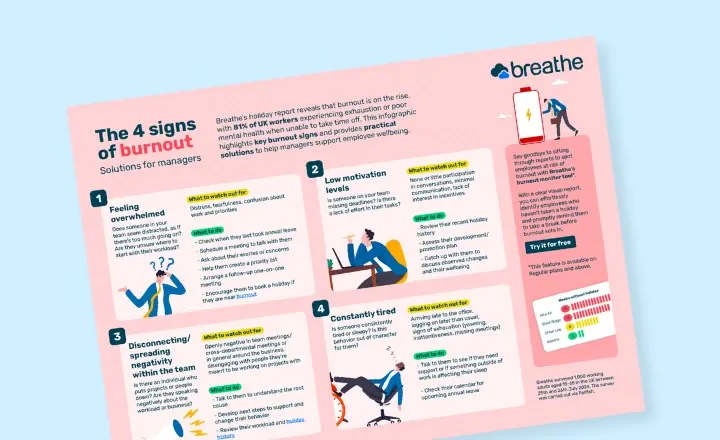Free up time for what's important
Holidays are stress-free, so why isn’t holiday management? Start your free trial today and you'll see how simple holiday management can be with Breathe.


In recent years, employers and employees alike have faced shifting economic and workplace challenges - from political and social changes to global health crises and rising costs. These pressures have shaped how people work, rest, and take time off.
We commissioned this research with the aims of understanding how these ongoing pressures influence the amount of holiday people take and how well they’re able to disconnect when they do.
Staff who don’t take time off suffer from exhaustion, burnout, lack of energy, and low engagement - all of which impact productivity.
We believe that the vast majority of employers understand why a healthy attitude to time off is important. Nobody wants tired and stressed employees who eventually quit their jobs. So how do proactive, engaged employers avoid these issues?
We asked 1000 UK employees a series of questions to understand more about how much time off they’re taking and the reasons why. Here are the main questions we wanted to answer:
Chapter 1: The unused holiday epidemic
How much holiday are people using, and what’s stopping them from taking their full holiday allowance?
Chapter 2: The Disconnect Deficit: Why employees aren’t switching off during leave
How likely are people to work on holiday and, if so, why?
Chapter 3: GenZ on holiday - the generation holiday divide
How do holiday preferences and unused days differ between generations?
Chapter 4: The wishlist: What do employees actually want from their holiday
What PTO policies can you adopt to improve the employee experience and encourage a healthy attitude to time off?
Download our bitesize holiday report
In our research, we wanted to find out how much holiday people are taking and how wider workplace trends are affecting time off. We surveyed people working across various sectors in the UK to find out how much holiday is and isn't being taken - and more importantly, why.
Here’s what we found:
Workers feel too busy, understaffed, and worried about their jobs to take time off
• High workloads are leaving staff feeling overwhelmed and unable to take time off.
• Only 35% of UK workers use all their holiday days.
• 17% of respondents had 5 or more unused holiday days.
UK workers overwhelmingly think that lack of time off causes anxiety, burnout, and poor mental health
• 81% of people agree or strongly agree that they notice increasing feelings of burnout, exhaustion or poor mental health when they can’t take time off work.
Staff shortages were overwhelmingly the biggest contributing factor of unclaimed holiday
• 42% of individuals agreed that staff shortages were a contributing factor to unclaimed holiday, making it the most common reason regardless of the respondent’s gender, age, or income.
A majority of UK workers work on booked leave
• 57% of UK workers admit to working either ‘sometimes’ or ‘often’ while taking booked leave.
People don’t feel encouraged to disconnect from work while on holiday
• Only 37% of people agreed that their organisation encourages them to disconnect from work while on holiday.
GenZ are the least likely to take holiday and the most likely to work when they do
• Only 22% of 18-24 year olds use all their holiday days, the lowest amount of any age group, and 25 percentage points fewer than the over 54s.
• 74% of 18-24s also admitted to working either sometimes or often on holiday, also the highest of any age group.
The lowest-paid workers felt the least encouraged to take time off
• Only 33% of UK workers on less than £30,000 a year felt encouraged by their employer to disconnect, vs. 44% of those on £75,000+.
Employees are interested in taking additional unpaid holiday
• 58% of people said they were either ‘likely’ or ‘highly likely’ to take up to 5 days additional unpaid holiday a year, if given the option by their employer.
The first, and arguably most important question we wanted to answer was this: How much holiday are people actually taking? And how much has this changed in light of the pressures of recent years?
The results were more surprising than we expected:
1. The majority of UK workers don’t use all their holidays
The vast majority of UK workers are entitled to a state-enforced minimum holiday allowance of 28 days per year, or 5.6 weeks. Some employers choose to offer more and others have experimented with unlimited holiday, meaning no allowance is needed. But for most of the workforce, 28 days is fairly standard.
And yet we now know that most UK workers don’t use the whole allowance. In fact, only 35% of respondents said they have 0 days unused holiday days a year.

But when you look deeper into the data, some more worrying trends begin to emerge. Most importantly, almost a fifth of UK workers (17%) are leaving more than five days unclaimed at the end of the year.
This pattern, sometimes called 'holiday hoarding', happens when people save up their entitlement instead of spreading it throughout the year. While it might seem harmless, going too long without a break can harm health and wellbeing and increase the risk of burnout.
It’s not just us that have picked up this worrying trend. Independent research suggests that two in five workers take less leave today than they did before the pandemic. This is particularly the case in consumer-facing industries, where issues such as staff shortages and high workload have been the most pronounced. In retail alone, the total amount of leave taken dropped by 7.6% in 2023 and has decreased by 12% since 2020.
2. People get stressed and burned out when they can’t take time off
Perhaps the least surprising finding of our survey: 81% of UK employees either agree or strongly agree that they notice ‘feelings of burnout, exhaustion, or poor mental health when they can’t take time off work or haven’t done in several months’.

It’s not just employees who think this. Independent research also suggests that time off improves employee productivity by up to 40% and reduces the likelihood of sick leave by as much as 28%.
This data shows that taking time off is important for both the employee and the employer. Ultimately, nobody benefits from a tired, stressed, and unengaged workforce.
3. Workers are too busy, understaffed, and worried about their jobs to take time off
If respondents had one or more unused holiday days a year, they were also asked to specify the leading causes.
Here, some of the most surprising research of the whole survey emerged:

Staff shortages were overwhelmingly ranked as the most common cause of unclaimed holiday. As many as 42% of people included it as an option. In fact, it remained the biggest factor, regardless of the respondent’s gender, age, or income.
But while staff shortages are clearly the leading factor, they weren’t the only cause for concern. Other significant factors included:
‘I’m too busy’ - 28%
‘I worry about how it’ll reflect on my productivity and performance’ - 26%
‘I submit leave requests but struggle to get them approved’ - 22%
The picture this paints is stark. People are too overworked, understaffed, and worried about their jobs and workload to take enough time off. The economic uncertainty of recent years has made it harder for people to take time off - and that can take a toll on both their mental and physical health, sometimes leading to needing long term sick leave.
The Breathe view: What should employers do now?
Pressures like staff shortages can be managed by being transparent and organised.
Write clear policies to govern how many people can take time off at the same time, while ensuring that workplace safety is maintained and workloads are managed appropriately.
Regularly remind staff to check their holiday allowance
Make sure staff know how far in advance they need to book in time off
Watch out for holiday hoarding - when people hold back their leave until late in the year. Encouraging people to book regular breaks, rather than storing days up, helps protect health, boost energy and reduce pressure across the team.
Have a staff holiday planner where all staff can easily see their holiday allocation and when others are off work
It’s also clear, however, that much of the issue is cultural. Employees worried about their jobs don’t want to be seen taking too much time off. This is a problem that compounds itself; the fewer people that take holiday, the more their colleagues worry about being seen as an outlier.
Here, employers can set the right tone by encouraging holiday and, where possible, leading by example. It’s important to reiterate that time off is healthy and doesn’t reflect on an employee’s perceived performance.
In fact, when people don’t take enough holiday, they start to burn out and this doesn’t just impact them - it harms the business too.
Burnout, exhaustion, and stress aren’t just caused by unclaimed holiday. People are now also increasingly likely to work on their holidays, which disrupts work life balance and is almost worse than skipping leave altogether.
Today, the boundary between work and personal life is thinner than ever. Increasingly, people work from home and receive emails on their personal phones. In this ‘work from anywhere’ world, it’s easier than ever to take your work on holiday with you. The days of leaving your work at the office until the next day are now long behind us.
Of course, this flexibility comes with plenty of benefits for employees. But with fewer clear boundaries between work and the rest of your life, it can be difficult to properly disconnect - particularly on holiday.
We’re calling this phenomenon the Disconnect Deficit - and as part of our research, we wanted to find out just how widespread it really is.
1. A majority of UK employees work during leave
As many as 57% of UK workers admit to doing work on annual leave, either ‘sometimes’ or ‘often’. That means only 43% of employees completely disconnect while they’re taking time off.

It’s clear that changes to working styles have made working on holiday more common in the last few years. But to have more people working on holiday than not is a surprising and worrying development.
To understand the scale of the problem, it’s again helpful to take a step back and consider the reasons behind this phenomenon.
2. People don’t switch off on holiday for the same reason they struggle to take it in the first place
We went on to ask the 57% of employees who admitted to working on holiday to list the reasons why. The results painted a worrying picture of overworking, anxiety, and stress.

Overwhelmingly, the leading cause of the Disconnect Deficit was a desire to avoid getting behind on work while away. But the other popular factors were almost equally concerning:
“I want to avoid a work backlog when I return” - 55%
“I worry I’ll get behind on my work” - 48%
“Other team members aren’t able to cover work in my absence” - 35%
These factors suggest that staff shortages are likely a significant factor here, as well as a general feeling of having too much work and responsibility to properly disconnect.
3. Employers and managers aren’t doing enough to encourage people to disconnect during leave
The same question also revealed some even more worrying causes of the Disconnect Deficit. Many people simply felt pressured to continue working.
34% of those who had unclaimed holiday said that “managers send emails/messages and I feel pressured to respond”. While it isn’t the most popular reason, the fact that it was even this common is a cause for concern. This suggests that much of the Disconnect Deficit is down to culture and perception - as well as the more concrete structural issues of understaffing.
To find out more about this phenomenon, we also asked all respondents to gauge how much their company encourages them to disconnect during leave.
The results were, again, surprising. Only 37% of people felt encouraged by their organisation to disconnect while taking time off. The rest felt either actively discouraged from disconnecting - or felt their employers were ambivalent either way.

Given the amount of people who work on holiday, this is surprising. Even more shocking, however, is the fact that 72% of managers say they encourage staff to switch off during the holidays. It’s clear there’s a huge disparity between employers and employees when it comes to how effectively organisations encourage their teams to disconnect.
Clearly, employers have much room for improvement here.
But when we looked further into the demographic breakdown of this question, we found some even more worrying signs.
4. The lowest-paid UK employees feel the least encouraged to disconnect
It’s commonly believed that higher-paid employees work the longest hours, take the least holiday, and are less likely to disconnect while on holiday. But, our research suggests the opposite is true.
When we adjusted the responses based on the respondent’s salary, we found the lowest-paid employees felt the least encouraged to disconnect:
Only 33% of those on less than £30,000 a year felt encouraged to disconnect
For those paid between £30,000 and £75,000, the number rose to 37%
For those paid more than £75,000 a year, the number rose again to 44%
%20(1).webp?width=600&height=476&name=My%20company%20encourages%20me%20to%20completely%20disconnect%20from%20work%20during%20annual%20leave_%20(salary)%20(1).webp)
The results show a clear trend: The more you earn, the more comfortable you feel disconnecting while on holiday. This is surprising and worrying, because it’s the lowest-paid staff who are most likely to worry about their jobs in an economically volatile backdrop.
The Breathe view: What should employers do now?
Setting clear boundaries and making a conscious effort to create a division between work and personal time are essential to reduce stress and protect overall well-being.
People should feel encouraged to talk openly with their managers or colleagues about workload and expectations, so they can better manage stress and set realistic boundaries. This is especially important for hybrid or remote staff (those who work from home).
- Lead by example. Leaders and managers in the organisation should disconnect as much as possible and avoid sending messages to junior staff while on holiday.
- Create a Right to Disconnect policy. This gives workers the right to reclaim their personal time as their own, endorsed by the organisation.
- Encourage staff to take responsibility for their own health by making use of their holiday and fully disconnecting from work during time off.
- Be on the look out for signs of burnout so you can better prevent it. Use our handy infographic.
- Implement a wellbeing notice. This is a simple line at the end of an email that makes it clear a response isn’t expected straight away: “If you have received this email outside of normal working hours, I have sent this at a time that works for me. Managing work and life responsibilities is unique for everyone, so please respond at a time that works for you.”
- Work closely with occupational health professionals to support any employees who are experiencing stress or burnout.
Culture and perceptions are a huge part of why people work on holiday. Employees don’t want to be seen to be the only person on the team that doesn’t do so.
Managers need to understand that doing work on holiday is not something to encourage. And people shouldn’t feel that doing a bit extra while they’re off is an easy way to get extra kudos.
In recent years, there’s been a lot of discussion about how different generations interact at work. With more and more ‘Gen Z’ employees joining the workforce for the first time, their older colleagues are starting to notice differences in style, values, and approach.
A lot of the conversation around how Gen Z behaves at work assumes that they’re less hardworking, focused, and dedicated than their older colleagues.
So it’d be easy to think Gen Z are more likely to take time off — and less likely to work while they do.
But our research demonstrates the exact opposite.
1. Gen Z are taking less holiday than all other generations
When we asked employees of all ages how many unused holiday days they had per year, the results were surprising, with only 35% using all their days. But when we restrict this question to just the youngest cohort of respondents, we find that number drops to only 22%.
That means that Gen Z respondents are a full 12 percentage points less likely to use all their holiday days than the average UK employee.
.webp?width=600&height=600&name=How%20many%20unused%20holiday%20days%20do%20you%20have%20on%20average%20each%20year_%20(18-24%20only).webp)
2. Gen Z are also doing more work on leave
The trend isn’t just restricted to how many days off young people are taking. In fact, they’re also much more likely than their older colleagues to work on holiday as well.
74% of our youngest respondents admitted to working on leave either sometimes or often.
.webp?width=600&height=600&name=Do%20you%20ever%20work%20while%20you%E2%80%99re%20on%20holiday%20or%20annual%20leave_%20(18-24%20only).webp)
Again, this finding shows a clear trend, and the number gradually decreases with age: 25-34 (62%), 35-44 (62%), 45-54 (46%), and 55+ (43%).
.webp?width=600&height=541&name=I%20work%20on%20annual%20leave%2c%20either%20sometimes%20or%20often%E2%80%9D%20(1).webp)
Curiously, this trend remains the case even when we focus on the lowest-paid workers. If we restrict our answers to only those who earn less than £30,000 a year, a similar trend begins to emerge:
Here, we see that 82% of the lowest-paid 18-24 year olds admit to working on leave sometimes or often. This is even more than the average for that age group, 74%.
.webp?width=600&height=554&name=I%20work%20on%20annual%20leave%2c%20either%20sometimes%20or%20often%E2%80%9D%20(2).webp)
This clearly suggests that the lowest-paid workers are more, not less, likely to work on holiday. This tracks with the average for all age groups which we discussed in the last chapter.
Again, the older respondents were less likely to work on holiday, even when adjusted for earnings. Of those who earned less than £30,000 a year, 48% of 25-34 year olds admitted to doing work sometimes or often on holiday, compared with 56% of 35-44s, 45% of 45-54s, and 47% of over 55s.
3. Gen Z feel the least encouraged to take time off by employers and managers
We also wanted to find out to what extent different generations felt encouraged by their employers to take time off and disconnect when they do. Again, the results here were stark:

The youngest employees were the least likely to say they felt encouraged by their employers to disconnect while on holiday. In fact, 67% of 18-24s said their organisation either doesn’t encourage them or actively discourages them from disconnecting. For those aged 35-44, the figure rose to 38%, and again to 41% for the over 45s.
.webp?width=600&height=477&name=My%20company%20encourages%20me%20to%20completely%20disconnect%20from%20work%20during%20annual%20leave_%20(age).webp)
This points to Gen Z struggling more with work pressures and expectations, leading them to forgo much-needed breaks and be at greater risk of mental ill health.
The Breathe view: What should employers do now?
- Avoid age-based stereotypes. Make sure all staff are educated on ageist attitudes and behaviours.
- Check in with younger employees. Not only are they less likely to take holiday, but they’re also most likely to be experiencing the mental health impact of the pandemic in a way that older workers might not fully understand.
- Model healthy working behaviours and have clear policies on disconnecting and annual leave. Younger workers are forming their workplace expectations based on the behaviours they see around them.
There’s a lot to be said for encouraging a healthy attitude to time off in your workforce. As we explained in previous chapters, you can achieve a lot simply by encouraging people to take time off and disconnect when they do.
But it’s not the only area where employers can make a difference. In fact, there’s a considerable amount of choice you have over what holiday policies you offer:
While unlimited holiday has become increasingly popular in recent years, it remains controversial. The main argument against it goes like this: if you remove the official allowance, people won’t know how much holiday is acceptable to take. The risk, therefore, is that they’ll end up taking less.
To get to the bottom of this controversy, we asked employees which they’d prefer; unlimited holiday or 5 extra days added on to their paid leave allowance each year.
The results were fairly split, but most opted for unlimited holiday (60%) over the five additional days (40%).

This remained the case regardless of the age of the respondent. Though older workers were slightly less likely to opt for unlimited holiday than the average, they still remained in a majority.

So how does this compare with the amount of holiday that people are actually taking? Research from Expedia suggests that those with unlimited holiday policies take on average an extra week of holiday annually.
But not all organisations are convinced - including some that tried the policy and then rejected it. This is generally because they found the policy encouraged staff to take less holiday, not more. There’s clearly a lot of variation in the success of these policies in different companies.
Read more - Unlimited holiday: What are the pros & cons for SMEs?
Despite this, the policy seems popular with employees, so it’s worth considering. If so, you should monitor how much time people are taking off to ensure the policy is discouraging an anti-burnout culture.
2. What do people want to do with unclaimed holiday?
We asked employees to imagine that they had 5 days of unclaimed holiday at the end of the year. Would they prefer to add the days on to the following year’s allowance, or reclaim the time as additional payment?
Again, the results here were fairly mixed. Nonetheless, a small majority preferred to carry the days over vs. reclaiming as payment - 56% vs. 44%.

Generally, the trend was the same regardless of the age or gender of the respondent. In all cases, a majority preferred to carry over unused days.

3. People are surprisingly interested in unpaid holiday
We were also interested to find out how many people would be interested in taking additional unpaid holiday if given the option.
This question threw up some surprising findings. In fact, 58% of those who replied said they were either ‘likely’ or ‘highly likely’ to take advantage of such a policy, were it to be offered.

Understandably, those most in favour of this policy tended to earn the highest incomes. Of those who made more than £75,000 a year, 74% said they’d be interested in taking advantage of an unpaid holiday policy.
Though the majority was lower, workers on the lowest incomes were also in favour of the policy. 56% of respondents who earned less than £30,000 said they would be likely or highly likely to take the offer.

The Breathe view: What should employers do now?
- Consider running an Employee NPS to better understand your team’s needs
Ask your staff for their input. Understand what they’d like to see, or whether they’re happy with their current holiday allocation.
Conduct analysis on holiday uptake within your organisation, and also monitor other absence such as sick leave - is there a pattern here?
If you’re considering unlimited leave, be sure to understand what people actually want and expect from this. It can help to have minimum limits.
Make sure any holiday policies are affordable for your organisation.
We commissioned this research because we fundamentally believe in the power of rest and time off to make employees more engaged, focused, and productive. Research conclusively shows that regular time off is a benefit to both the employee and the employer.
In our view, very few employers deliberately create a culture of burnout and overworking. But it’s easy to understand why in a world of staff shortages, rising labour costs, inflation, and more - time off can easily fall down the priority list. The challenge for employers is to recognise this trap and take proactive steps to avoid falling into it.
Every organisation is different - and there’s no one solution to burnout and unclaimed holiday. Nonetheless, our research suggests that employers can make a lot of difference simply by encouraging their team to take holiday and disconnect when they do. With so few employers effectively doing so, there’s a huge difference you can make here.
If there’s only one piece of advice you take away from this report, it should be this: as an employer, HR leader, or manager, what you say and do matters.
Employees look up to their leaders, superiors, and peers to understand how much holiday they should take and to what extent they can disconnect when they do. The tone you set and the values you embody can make a huge difference to the working culture of your organisation. Anyone looking to avoid the dangers of the unused holiday epidemic and the disconnect deficit should start here.
Continue the conversation - Watch our on-demand webinar "The Unused Holiday Epidemic" to hear culture and employment law experts discuss the data and share tips for creating a healthier holiday culture.
The paid time off work that staff are entitled to each year. In the UK, this is a statutory minimum of 28 days (including bank holidays) for full-time workers, though some employers offer more to support health and wellbeing and prevent work related stress.
Burnout is a state of emotional, mental and physical exhaustion caused by long-term or repeated workplace stress. It can lead to reduced productivity, low motivation and health issues, and it’s recognised by the World Health Organization as an occupational phenomenon.
It doesn’t happen overnight – it’s the result of ongoing stress and too much pressure, often compounded by a range of workplace factors. Excessive workloads, lack of control over tasks and poor work-life balance are some of the most common contributors. When people feel they can’t take their full holiday entitlement or don’t have enough support, the risk of physical and emotional exhaustion rises sharply.
Understanding the true impact of burnout is essential for any organisation committed to health and wellbeing. Employers can start by tracking key indicators such as absenteeism and staff turnover. Regular employee satisfaction surveys and stress audits provide valuable insights into where people may be experiencing stress or feeling under too much pressure.
Line managers are on the front line of occupational health, and their training is vital in spotting early signs of burnout. By using wellbeing surveys and monitoring trends, employers can identify areas for targeted support and health promotion initiatives.
Employers also play a crucial role in tackling the causes head-on. Promoting healthy eating, encouraging regular breaks and supporting employees to take their holiday can make a big difference. Open conversations about workload, setting realistic expectations and providing access to support services are all vital in protecting mental health. This proactive approach not only helps reduce the risk of burnout and long-term absence, but also shows a genuine commitment to employee wellbeing.
Investing in support and training creates a safer, healthier workplace where people feel valued and empowered. Ultimately, addressing burnout benefits everyone – staff are healthier and happier, and organisations see a more engaged, productive workforce.
To learn more and access practical resources, visit our Burnout Hub.
The point in the year when you should have taken at least half of your leave to reduce the risk of burnout. For most organisations in the UK, this falls on 2nd July.
Time off work for people who need to care for a dependent, such as a child, partner or relative with long-term needs. This may be paid or unpaid, and is important for ensuring wellbeing for both the worker and the person they care for.
Ongoing duties an employee may have to care for someone else, such as looking after children, elderly relatives or dependants with disabilities or long-term illnesses. Managing these alongside a job can add pressure and may require employers to be flexible and responsible.
When staff take leave but continue to work, check emails or stay “switched on” to work matters. This prevents proper rest, impacts health and wellbeing, and can have the same negative effects as not taking holiday at all.
A confidential support service provided by employers, often including counselling, legal advice, and practical help for personal or work-related stress. Encouraging workers to talk openly about challenges can help address problems before they escalate.
An overarching term covering physical, mental and emotional health in the workplace. Prioritising health and wellbeing helps people manage pressure and perform their jobs effectively.
Holiday entitlement is the amount of paid time off employees can take each year. This time away from work helps maintain a healthy work-life balance and can reduce issues like work-related stress. The legal minimum is set by law, but some organisations offer more than the maximum required to support wellbeing.
Holiday entitlement applies to everyone and can be used for rest or personal commitments. It's not designed to be used for skill training or sickness. By making sure each department manages leave fairly, businesses can protect the quality of work and the health of their people.
When people deliberately save up their holiday instead of spreading it evenly throughout the year. While sometimes done for big trips or personal reasons, holiday hoarding can increase work related stress, reduce rest periods, and heighten the risk of burnout if workers go too long without a proper break.
Staff who split their time between working in the office and working remotely. Hybrid working can give workers more flexibility, support better health and wellbeing, and help reduce work related stress when managed well. Employers should ensure hybrid workers feel included, have the right skills and tools to do their job safely, and are encouraged to take regular breaks.
When someone’s away from work for four weeks or more because of illness, injury, or health conditions such as work-related stress. Taking this time can benefit recovery and overall wellbeing, helping people return to work feeling healthier. It also gives a sense of security, knowing their health comes first.
Specialists who help keep people healthy and safe at work. They assess how someone’s job might affect their health – including issues like work-related stress – and how their health might affect their work, offering advice, support, and practical solutions.
A general term for time away from work that is still paid, such as annual leave, public holidays, and sometimes sick leave or personal days.
Staff who carry out their job entirely away from the employer’s main office, often from home or another location. Remote working can offer flexibility and save time, but it also requires clear communication, a safe working environment, and regular check-ins to support wellbeing. Without this, remote workers may feel isolated or under pressure.
A workplace policy that gives people the right to ignore work communications outside their normal hours without penalty.
Leave that people are legally entitled to under UK employment law, such as annual leave, maternity leave or paternity leave. Statutory leave ensures workers have rest periods to safeguard their health and safety.
A physical and emotional response to pressure, demands, or challenging situations. In the workplace, stress can come from heavy workloads, tight deadlines, or poor work-life balance. Ongoing stress can affect a worker’s health, safety, job satisfaction, and skills performance.
Managing stress is vital for long-term wellbeing and productivity. Simple techniques like deep breathing can help calm the body and reduce feelings of panic or anxiety. Focusing on positives and expressing gratitude can also ease stress levels and improve mood.
A policy where staff can take as much paid time off as they need, with no set limit — usually relying on trust and workload management rather than a fixed allowance. Without a supportive culture, workers may still leave holiday unused.
Paid leave an employee is entitled to but has not taken within the holiday year.
The measures taken to protect staff from harm, both physically and mentally. Safety policies should address not only accidents and hazards, but also psychological safety to reduce work related stress.
About Breathe
Breathe is the UK's leading provider of HR software for SMEs, empowering teams to simplify their people admin.
Manage holiday schedules and other absence management all in one place, monitor job burnout and track employee performance. Make reasonable adjustments to support employee wellbeing and ensure your policies are reasonable and inclusive.
Track how your team is feeling with Employer NPS and keep all HR tasks under control with a clear and easy to use HR dashboard.
Find out more: Explore Breathe for yourself with a completely free two-week trial? Sign up for a free trial or watch our 5-minute holiday features demo.

Packed with actionable insights, this resource provides everything you need to handle time off effortlessly.

Ensures your people feel encouraged to switch off during their well-deserved breaks with our right to disconnect policy template.

To help you spot the signs of burnout, we've provided practical solutions to help you and your managers support employee wellbeing.
Holidays are stress-free, so why isn’t holiday management? Start your free trial today and you'll see how simple holiday management can be with Breathe.

